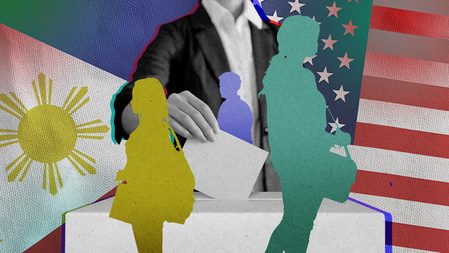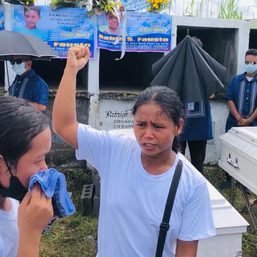SUMMARY
This is AI generated summarization, which may have errors. For context, always refer to the full article.
![[OPINION] How to respond to pain: Thoughts from a Filipino DACA recipient](https://www.rappler.com/tachyon/2020/11/daca.jpg)
DACA came into my consciousness under a different name. It was at the height of the immigrant youth movement. I was an undocumented college student at UCLA and in the early stages of my organizing journey. During a retreat in the summer of 2011, just as the school year was about to begin, leaders in our organization were talking about a new strategy proposed by national advocates. This was after Congress failed to pass the Federal Dream Act months before. They used terms like “prosecutorial discretion” and “administrative relief” as a way for President Obama to use his executive power to stop the deportation of immigrant youth. By the end of that academic year, on the very graduation day of those student leaders, President Obama would announce the policy known as Deferred Action for Childhood Arrivals, or simply, DACA.
Nearly 10 years since that fateful summer retreat, we face one of the most decisive elections in US history, at the height of both a pandemic and the rise of fascism across the globe. Undoubtedly, this will significantly impact the lives of Filipinos, including those like me who are undocumented.
DACA changed the prospect for many undocumented young adults like myself. Not only did deportation become less of a worry, it also allowed us to get a driver’s license, to travel to other countries when “Advance Parole” was still available, to pursue professions that seemed out of reach, and to even engage in nightlife without the embarrassment of showing passports when we got carded because we could finally have a government-issued ID. Although DACA opened up new doors for many of us, it hasn’t been without its limitations as well.
When I first started as a filmmaker around 2013, I was adjusting to the new possibilities DACA afforded me. Now that I had a Social Security Number, I believed I could finally do anything in the US – except vote, of course. I learned about an amazing opportunity — an Assistant Directors Training Program run by the Directors Guild of America — but when I looked at the eligibility requirements after I began working on my application, I noticed that one of the criteria for acceptance was that an applicant must be a US resident or citizen. When I contacted the program and explained that I have DACA, I still vividly remember the response: “We want people who get into this program to stay in the country and work in the industry, so we unfortunately cannot take people who are neither residents nor citizens.”
Seven years later, as I write this op-ed, I’m still in the US navigating my way through the film industry. And between that moment and the present, that phone call would not be the only time I would experience systemic exclusion in the film industry because of my immigration status.
As I began working on my own independent documentary projects, mentors and other filmmakers would encourage me to apply for filmmaking grants and fellowships. Yet, again, when I pursued many of these opportunities (even though they come from grant-making institutions that claim to support immigrant rights), US citizenship and residency continued to be part of the eligibility requirements, preventing me from accessing resources not because of the quality of my work, but because of my status, making it impossible to even apply for resources. All the while, US citizens creating media about undocumented immigrants like me get the resources and platforms for their projects even though they have never lived my experience and often simply regurgitate the same perspectives and stereotypes about my community.
Beyond this exclusion are even more far-reaching limitations from DACA. Of the estimated 12 million undocumented people in this country, roughly somewhere between 650,000 and 800,000 have been privileged enough to even apply for and receive DACA. Of those not covered by DACA, two are my own parents.
Just a month before DACA was announced, my dad actually had to return to the Philippines to care for his ailing mother, but because of his immigration status when he left, he couldn’t return. It’s been nearly a decade since I’ve seen my dad in person, but we talk on the phone these days to update each other about how the countries where we live are handling the pandemic respectively.
When my dad went back, this turned my mom into an unofficial single-parent, supporting 3 children. Challenging as it may have been, my mom found a way to pull through for our family. Even though she couldn’t drive (and still cannot), my mom would find ways to make it to important functions in my life, even if she had to take the bus around Los Angeles for hours.
But this determined woman has now become more cautious. I remember when Trump became President. A mentor of mine had mentioned a dream my mom had shared. In her dream, she was on the bus when ICE agents entered to remove her. I never heard this story directly from my mom – maybe because she didn’t want me to worry. But I often ask myself: Is DACA really as good as they claim it is, when my dad can’t even return to his family and my mom has nightmares of ICE taking her?
DACA did offer me opportunities that I never thought would be possible when I was younger, but it’s not just about me. I am part of a family. I am part of a community. My wellness depends on their wellness too.
During a pandemic, our interdependence becomes that much more important, and undocumented immigrants like my parents are indeed put in a more disadvantaged position. In spite of having no access to health care or retirement benefits, my mom who is now in her 60s has been going to work because she is deemed essential. A bookkeeper, my mom expertly handles taxes for clients. I love seeing how proud my mom becomes when her clients compliment her work. The unjust irony is that, because of her immigration status, my mom can’t access the very public services that she helps her clients contribute to and that she herself contributes to through her own tax dollars.
And during this time of a global uprising, the intersectional issues of immigration enforcement and police terror against Black bodies requires a closer look that should lead us to action rooted in solidarity. We need to connect the dots between the system that puts immigrants in detention centers and the system that incarcerates Black people. It’s futile to call out how this country invests billions of dollars to further militarize immigration enforcement without also calling out how cities invest billions of dollars in the police. As Patrisse Cullors reminded us, “If you were willing to say #AbolishICE, I need you to be willing to say #DefundThePolice.”
I can’t quite choose the right word. Is it strange? Serendipitous? Dangerous? Or fortuitous? But the timing of the US election brings to mind a quote by the artist Kate Deciccio (it’s a reference to the implications of the coronavirus on our daily lives): “If we get this right, we’ll never go back to normal.”
If a Democrat gets elected president, will we just celebrate and return to what was there before (after the conundrum that Trump will cause)? Or will we DACA grantees and immigrant rights advocates find new ways to build solidarity with undocumented people who do not benefit from programs like this? How can we go beyond slogans like #HereToStay and #HomeIsHere, and break down US foreign policies that caused our families to call another place home, instead of having the same opportunities to thrive by staying in the land of our ancestry?
As much as I hate to say it, I also think about what would happen if Trump gets re-elected. There’s no doubt it will be consequential not just for immigrants in the US but for the world at large. But it also makes me reflect on how undocumented filmmakers like myself organized in the face of exclusion in our field – despite DACA. I’m privileged to have been part of creating the Undocumented Filmmakers Collective, which has pushed for more accountability in the documentary field around storytelling practices for undocumented narratives. Slowly, we’ve begun to see film funding remove US citizenship and residency requirements. We look to our predecessors — like the original founders of the philosophy of UndocuMedia — as we assert the leadership of undocumented people in the cultural sphere, beyond just the legislative and advocacy sectors.
This challenging moment also inspires me to think about how DACA was born to begin with. When the Federal Dream Act failed to pass in December 2010 (because 6 Democrats voted against it), undocumented organizers across the US strategized. It wasn’t out of the kindness of President Obama’s heart that this policy came to be, when he announced it in June 2012. It was the political pressure he got during an election year from undocumented youth organizers. It was the brilliance and tenacity of my undocumented predecessors (specifically, Neidi Dominguez) that made this possible, as they risked getting arrested and deported to win DACA.
Regardless of election results, we need to make sure that our rhetoric does not dichotomize between a more-deserving DACA population and everyone else in the undocumented community. These kinds of harmful messages impact Black immigrants the most, as Marybeth Onyeukwu wrote in 2015: “These advocates aim to separate out ‘innocent’ immigrants from ‘criminal’ immigrants, thus excluding and discarding Black immigrants, who are disproportionately targeted by the police and criminal legal system.”
At a time when immigrant rights advocates are making statements in solidarity with #BlackLivesMatter, we also have to underscore that Black undocumented immigrant lives matter and that we are committed to dismantling anti-Black racism in our movements too. How do we push the envelope to build new, more meaningful forms of solidarity during extreme times like these?
A global pandemic and a fascist white supremacist US administration – if this isn’t the time to imagine new strategies, to organize more intentionally, and to manifest new possibilities, then when? I don’t want to romanticize the situation because we have to acknowledge that it isn’t hard to fall into deep fear and worry during this time. But to borrow from the words of the indigenous Maori scholar Linda Tuhiwai-Smith from her book Decolonizing Methodologies: “The remembering of a people relates not so much to an idealized remembering of a golden past but more specifically to the remembering of a painful past and, importantly, people’s responses to that pain.”
When I realize that my community is often unable to depend on those in power, I look to my ancestors in the Philippines who fought against colonization and the erasure of our heritage. I look to my queer, trans, and non-binary ancestors in the ‘80s and ‘90s who stood against the AIDS epidemic. I look to the centuries-long movements led by Black people that have consequentially allowed immigrants of color to have the political gains we’ve had in the US. I look to my undocumented predecessors that paved the way for me so that victories like DACA could be possible – imperfect as these short-term solutions may be. I look to my mom, my dad, and my siblings who inspire me with their resilience when things get tough. I look to how those before me responded to pain. Hopefully, someday, others can look to how we’re responding today and draw inspiration from us, too. – Rappler.com
Set Hernandez Rongkilyo is Co-Founder of the Undocumented Filmmakers Collective.
Add a comment
How does this make you feel?















![[Edgewise] God didn’t save Trump from the bullet, immigrants did](https://www.rappler.com/tachyon/2024/07/thought-leaders-trump-immigrants-intervention-07242024.jpg?resize=257%2C257&crop_strategy=attention)
There are no comments yet. Add your comment to start the conversation.